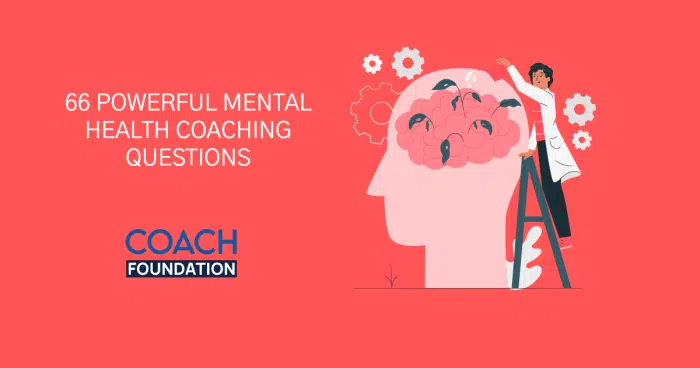Blog » Fundamentals of Coaching » 66 Powerful Mental Health Coaching Questions
66 Powerful Mental Health Coaching Questions
A mental health coach is a professional who helps people manage their mental health. They work with people to identify goals and develop action plans to improve their mental health. They also provide support and guidance to help people stay on track. Mental health coaches often have a background in psychology or counseling, and they may also be certified in mental health First Aid.

Why Asking the Right Questions is Important
One of the most important skills for a career development coach is the ability to ask the right questions. This may seem like a simple task, but it can be difficult to know what information your client needs in order to make progress.
Asking the right question at the right time can help to uncover hidden interests and talents, set realistic goals, and create a plan of action. In addition, asking questions can also help to build rapport and trust between the coach and the client.
Strong questions allow the coach and client to establish a clear understanding of expectations and attack the coaching process with intention and purpose.
Remember, a successful coaching relationship is built on open communication and a willingness to ask (and answer) difficult questions. Asking questions is a powerful tool for effective coaching, so don’t be afraid to keep the conversation going!
When done correctly, asking questions is a powerful tool that can help coaches effectively guide their clients toward career success.
Best Mental Health Coaching Questions
I’ve been a certified mental health coach for years, and one of the most common things I hear from clients is that they want help figuring out their life to attain mental peace.
Sometimes it can feel like there are no magic words or phrases to fix everything; however when you know what questions, they will lead towards greater clarity in any given situation – even if something isn’t quite right now- then we’ll all be able to find our way back home again together!
As a mental health coach, it is your job to help your clients find mental peace in life. This can be a challenge, but by asking the right questions, you can guide them toward greater clarity and fulfillment. Here are 66 life-purpose coaching questions to ask your clients:
- What are your thoughts on mental health?
- How do you think mental health affects your life?
- What are your thoughts on medication for mental health?
- What makes you feel most alive?
- What kind of work would you love to do?
- What do you want to be known for?
- Are you following your heart or your head?
- How can you listen to your heart more often?
- Do you feel like something is missing from your life that affects your mental health? If so, what is it that you yearn for?
- What would bring more meaning and fulfillment into your life?
- What steps can you take to begin living your ideal life now – even if it’s just in small ways?
- When it comes to your personal growth and development, where do you want to focus your attention and energy?
- What areas of your life need more attention or healing for better mental health?
- Who are the people that inspire and motivate you?
- What are your thoughts on stress and mental health?
- What are your thoughts on relationships and mental health?
- What are your thoughts on mental health in the workplace?
- What kind of books, articles, or blogs do you enjoy reading that help support your mental health growth and development?
- Who or what do you need to let go of in order to move forward on your path to better mental health?
- Are there any fears or doubts holding you back from living your best life possible? If so, what can you do to face those fears and overcome them?
- Do any old patterns or habits need to be broken in order for you to move forward?
- What new beliefs or perspectives do we need to adopt?
- What actions need to be taken in order for your goals to be achieved?
- How can you become more self-aware and attuned to your inner guidance system?
- Are you making time each day for self-care and personal recharging?
- Are there negative thought patterns or emotions that need to be addressed and transformed?
- What would you do if you had all the time and money in the world?
- What makes you feel most alive?
- What are your unique talents and strengths?
- What are your core values?
- What do you enjoy doing most?
- What are your deepest passions?
- What causes or issues are you most passionate about?
- If you could change one thing in the world, what would it be?
- Are you living a life that is authentic to you, or are you living someone else’s version of what they believe is the right way to live?
- How much time do you spend doing things that don’t bring you joy or fulfill your purpose?
- Do you feel like your life has meaning and purpose, or do you feel like something is missing?
- Are you living in alignment with your values, or are there areas of your life where your values are not being met?
- Do you feel like you are making a difference in the world, or do you feel like your contribution is insignificant?
- If you were to die tomorrow, what would be your biggest regret?
- Are there any areas of your life where you feel stuck or trapped?
- Do people in your life support your dreams and goals, or do they try to hold you back?
- What steps have you taken to pursue your dreams and goals?
- What unfulfilled dreams do you have?
- How do you think therapy can help with mental health?
- What are your thoughts on self-care for mental health?
- How do you think diet and exercise can help with mental health?
- What are your thoughts on sleep and mental health?
- Have you ever felt like giving up on your dreams? If so, why?
- How committed are you to achieving better mental health?
- Are you willing to do something different than what you’ve been doing in order to achieve your desired mental health results?
- What resources have you been using toward your mental health goals so far?
- Do you have a support system in place that understands and supports your mental health?
- Do the relationships in your life reflect the kind of person you wish to be?
- Is there anything standing in the way of having the mental health you truly desire?
- What practical steps can be taken to begin manifesting more abundance, love, and joy in the present moment mental health?
- Are adverse childhood experiences still affecting your mental health in adulthood?
- How can your mental health healing process begin?
- In what ways can our perceptions and interpretations be transformed so that they better support you on your journey to better mental health?
- What unhelpful stories from the past that affect your mental health can be rewritten so that they empower rather than disempower?
- How can loss, pain, challenges, and disappointments be transmuted into teachings and lessons that further move us along on our path to better mental health?
- If we view our lives as journeys, where are we right now, and where are we headed next?
- Are they any toxic beliefs or behaviors that need to be replaced with healthier ones?
- How can greater self-love and self-acceptance be cultivated for better mental peace?
- In what ways can greater forgiveness—for both self and others—be practiced?
- When we embrace our shadows, what gifts emerge from the darkness?
Conclusion
Mental health is an extremely intricate topic–especially for those who have been in the industry for many years like us! In today’s blog, I hope to give you a glimpse into some of the mental health questions I use to help people discover their strengths, passions, and purpose. I hope you found this list useful in your research and that you can use some of these questions in your own life!
As a coach, it is important to be curious and constantly ask questions. The more information you can gather from your clients, the better equipped you will be to help them. Use these questions (and others) to help your clients with their mental health.
Frequently asked questions
What are the 4 major questions of the coaching structure?
There are four major questions that coaches should ask their clients. These questions help to establish trust, identify goals, and create a plan for achieving those goals. The first question is “What do you want to achieve?” This helps the coach to understand the client’s goals and what they are hoping to accomplish. The second question is “What is your ideal outcome?” This helps the coach to understand what the client’s ideal result would be. The third question is “What are your options?” This helps the coach to identify different options for achieving the client’s goals. The fourth question is “What is your preferred option?” This helps the coach to understand which option the client prefers and why. Asking these questions will help coaches to better understand their clients and create a plan that will help them achieve their desired results.
What are some good questions for mental health?
There are a number of good questions that can be helpful in assessing someone’s mental health. Some examples include:
-How are you feeling today?
-Have you been experiencing any changes in your mood or energy levels?
-Have you been having any difficulty sleeping or eating?
-Have you been experiencing any intrusive or unwanted thoughts?
-Have you been having any difficulty concentrating or remembering things?
-Have you been feeling any more anxious or stressed than usual?
-Have you been avoiding any activities or situations that make you feel uncomfortable?
-Have you been feeling any more hopeless or down than usual?
Asking these questions can give you a better sense of how someone is feeling and whether they may be experiencing any mental health difficulties. If you are concerned about someone’s mental health, it is important to talk to them about your concerns and encourage them to seek professional help if needed.
What Are Some Good Coaching questions?
As a coach, one of the most important things you can do is ask the right questions. This will help you to get to the heart of what your clients are struggling with, and it will also help them to see things from a different perspective. But what are some good coaching questions? Here are a few examples:
-What are your goals?
-What is holding you back from achieving those goals?
-How can I help you to move forward?
-What would need to happen for you to feel successful?
-What steps are you willing to take to make that happen?
These are just a few examples of good coaching questions. Remember, the key is to tailor your questions to each individual client, and to always be respectful and non-judgmental. If you do that, you’ll be well on your way to helping your clients achieve their goals.


ABOUT SAI BLACKBYRN
I’m Sai Blackbyrn, better known as “The Coach’s Mentor.” I help Coaches like you establish their business online. My system is simple: close more clients at higher fees. You can take advantage of technology, and use it as a catalyst to grow your coaching business in a matter of weeks; not months, not years. It’s easier than you think.
AS SEEN ON
0 Comment